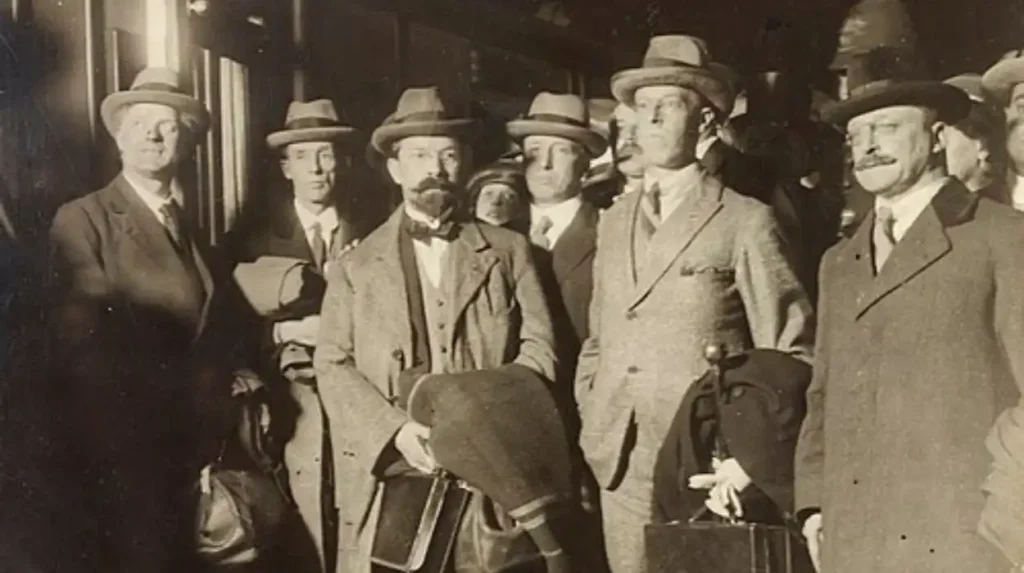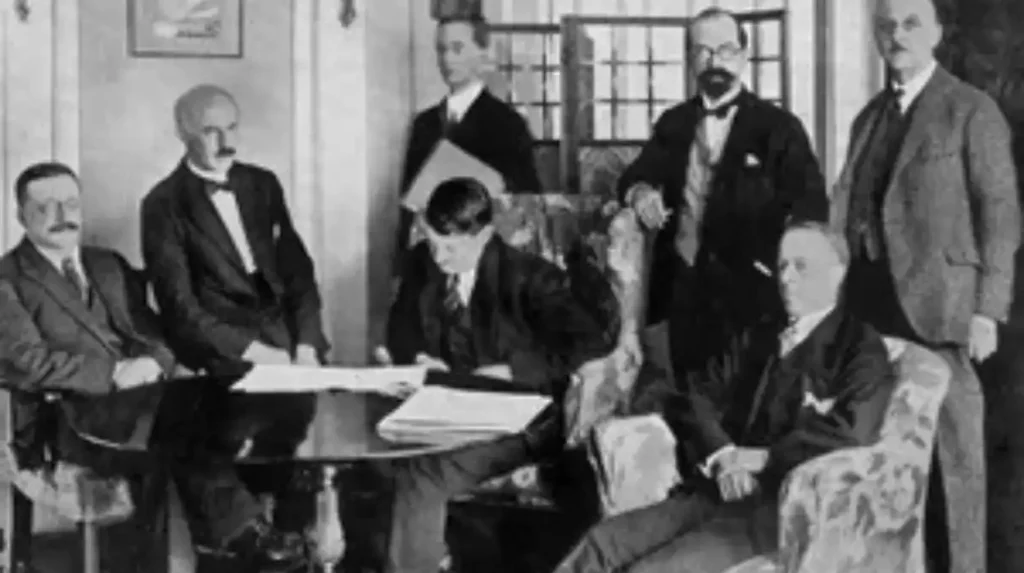The most significant treaty in British and Irish history is the Anglo-Irish Treaty of 1921. Signed following years of struggle, it ended the Irish War of Independence but also became the basis for great divisions within Ireland itself. Knowing its terms and their importance enables us to see why the treaty was a source of ongoing strife and a moment of success.
This article examines the treaty in great depth, dissecting its conditions, why they mattered, and how they affected the political development of Ireland and the United Kingdom.
The Terms of the Anglo-Irish Treaty
The treaty contained a number of parts that established both the constitutional future of Ireland and the political relationship of Ireland and Britain. Each term of the treaty represented a compromise between Irish ambitions for independence and British demands to maintain unity in the empire.
1. Creation of the Irish Free State
The Irish Free State was one of the prominent terms of the treaty. This constituted the fact that Ireland would be a self-governing dominion of the British Commonwealth, similar to Canada or Australia. While it gave Ireland significant self-government, it was not the full republic many nationalists desired. For Britain, this was enough for Ireland to remain an acolyte of the British Crown, even if only nominally. For Ireland, it was a critical step away from direct British governance, with their own parliament and government for the first time.
2. The Oath of Allegiance to the King
One effective issue was that Irish parliamentarians had to agree to an Oath of Allegiance to the British monarch. This oath recognized the King as the honorary head of the Commonwealth. Many Irish Republicans viewed this requirement as further disservice, not just to the agreement of a new government, but to the wider cause of Irish independence.
For Britain, the Oath was important to signal its constitutional ties. The Oath also became a considerable controversial point, with acrimonious debate and disagreement within Ireland, eventually contributing to the Irish Civil War.

3. British Retention of Ports (Treaty Ports)
Another considered damaging part of the agreement allowed Britain to keep certain naval bases, treated as ‘Treaty Ports.’ The three ports of Berehaven, Queenstown (Cobh), and Lough Swilly. These ports ensured Britain’s military security to protect French transatlantic routes while also maintaining Britain’s hold on military security in Ireland while maintaining an Irish government.
For Ireland, retaining sovereignty over Irish ports symbolized continued British interference in Irish affairs, flying in the face of its proclaimed independence. Ireland did not receive these ports until 1938, nearly 20 years after the signing of the treaty.
4. The Status of Northern Ireland
The treaty acknowledged and made allowance for the status of Northern Ireland, which was established under the Government of Ireland Act 1920. It specifically allowed Northern Ireland to leave the Irish Free State, which it quickly did. This action further cemented the division of the island into Northern Ireland and the Irish Free State, a division that continues to shape politics today.
For Britain, Northern Ireland provided safe support for the unionist population in the north. For possibly most Irish nationalists, it meant a painful division in their homeland.
5. Financial and Defence Arrangements.
Also set out in the treaty were financial obligations between Ireland and Britain. Ireland would take on its share of the imperial debt, though further negotiations succeeded in reducing these obligations. In the area of defense, Ireland could not undertake any policy hostile to Britain and could not ally with Britain’s enemies. This was in Britain’s interests so it could ensure its security, but it also reduced Ireland’s independence concerning its foreign policy.
6. End of Hostilities and Amnesty
The signing of the treaty officially concluded the Irish War of Independence. A truce had been in place since July 1921 in the conflict, but the treaty legally finalized the war. The treaty contained provisions for both sides to release prisoners, which was a relief for many Irish families after a number of years of war. For some Irish families, it was a sense of compromise that made them feel that the sacrifices that the dead incurred during the struggle were dishonoured.

Why the Treaty Mattered
It formed the basis of modern Irish statehood as well as the base of Britain’s changed relationship with its nearest neighbor. The Anglo-Irish Treaty was significant not only as a political document.
- Path to Independence: The treaty gave Ireland more independence than they had ever had before, but not full independence. The Anglo-Irish Treaty established the procedures by which an Irish state gradually but surely separated itself from Britain. Ireland attained complete freedom in 1949 through that process.
- The Pro-Treaty and Anti-Treaty Divisions: There were two groups being formed that supported either the pro-treaty or anti-treaty. The pro-treaty said this was a realistic stepping stone to a treaty aimed toward freedom led by Michael Collins, while the anti-treaty rejected this idea on the grounds that it was a violation of the 1916 proclamation of the republic under Éamon de Valera. The tensions between the people were a cause of the Irish Civil War (1922-1923), a human calamity where comrades fought each other, causing wounds on society and Irish polity lasting for generations.
- The Partition of Ireland: Northern Ireland was region-wise separated from the rest of the island. Division has remained a subject for heated debates in Irish and British politics and continues to affect both in the course of the later conflict, which took on the zeitgeist, The Troubles (1968-1998).
- The Redefinition of Britain’s Empire: For Britain, the treaty was important because it established a precedent with respect to how to deal with nationalist movements in other parts of the empire. By granting dominion status, the British were willing to cede self-rule in local affairs in exchange for loyalty to Britain. This model would influence events in India, Africa, and other areas of the empire.
- Legacy in Irish Politics: The treaty would come to define Irish politics for the next fifty years or more. The pro-treaty and anti-treaty sides would eventually become the two main political parties: Fine Gael was pro-treaty, and Fianna Fáil was anti-treaty. The treaty established a state and defined the ideological boundaries of Irish politics for a generation and beyond.
Long-Term Consequences of the Anglo-Irish Treaty
The treaty’s long-term consequences are impossible to overstate. While facilitating a separation from Britain that would absolutely continue into the twentieth century, it also institutionalized divisions that would prove very difficult to overcome.
- Irish Sovereignty: Over the course of time, Ireland dismantled the treaty terms, but ultimately (a) removed the oath of allegiance, (b) regained the treaty ports, and (c) declared itself a republic.
- Northern Ireland issue: The partition that the treaty established would lay the foundations of violence from the later “troubles” and continues to be a matter of issue in a more general context today in the discussion of British-Irish relations.
- Relations with the Commonwealth: The treaty raised questions regarding how former colonies or territories can emerge as independent states while maintaining degrees of proximity to Britain and influenced much of future decolonization.

Why does the Anglo-Irish Treaty still matter today?
While neither a perfect remedy nor a conscious resolution, the Anglo-Irish treaty was transformative. The Anglo-Irish Treaty ended years of bitter violence, created the Irish Free State, and paved a way towards future independence. However, the Anglo-Irish treaty also left with it undone questions, namely, partition and a persistent political division between the North and South that would be a feature of Irish and British history for the next 100 years.
The treaty is regarded today as both a success and a tragedy. The treaty mattered because it meant compromise, progress, and conflict. Knowing the treaty’s provisions provides a sense of why history unfolded as it did and why discussions about Irish sovereignty, identity, and unification are as pertinent as ever.

